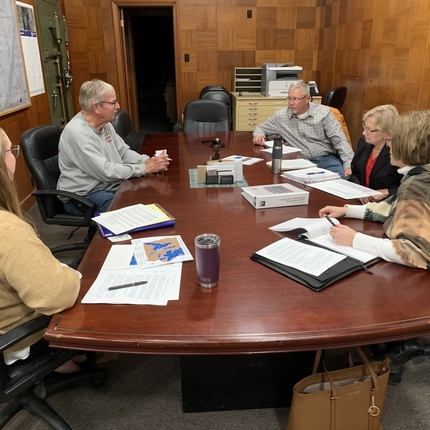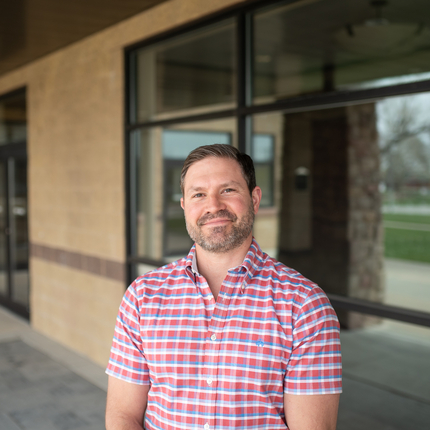Fifty years ago, founders of the Center for Rural Affairs knew that if they wanted policy to work for rural Americans, they had to raise their voices and grow a grassroots community.
Today, policy remains a big part of the Center’s work. And, our work, as well as the rural communities we live in, has evolved.
“Earlier attempts to influence policy relied more on grassroots activism and we don’t necessarily have that luxury today,” said Johnathan Hladik, policy director. “What we’ve had to do is expand our approach to focus more on building strong relationships with lawmakers, involving key stakeholders, and using incrementalism to meet our goals. We’ve had success with this over the past several years, and it will be exciting to see if and how this will change going forward.”
While the Center still engages grassroots supporters in policy change, Johnathan cites a declining rural population and a lack of political diversity in rural areas for the reduced effectiveness of such activism.
Value of rural policy
“Policy shapes the rules and regulations that govern our lives, but the vast majority of rural citizens don’t have a seat at the table and don’t have a voice,” Johnathan said. “Once you recognize this, the role of the Center for Rural Affairs becomes clear.”
In 1973, the Center started with a fight against corporate farming nationwide and in Nebraska. Since then, the policy program has evolved to tackle a wide variety of issues in new and different forums.
One focus today includes a growing concentration on small business policy, improving and managing advocacy for programs at the federal level, in addition to protecting, enhancing, and securing resources for programs at the Nebraska state level.
Another is renewable energy development near rural communities and the rules and regulations required for those developments.
And farm policy remains a big priority. Right now, preparations are underway for the 2023 farm bill.
“Most people probably equate policy work at the Center with farm policy and, over the years, this has remained an important part of our work,” Johnathan said. “This year, we are preparing several marker bills to be included in the farm bill that we think accurately reflect the needs and interests of the people that we serve.”
The final area of policy work is continuing to help rural residents who are most underserved.
“We have had success here in Nebraska stabilizing the Supplemental Nutrition Assistance Program and are working to make sure health care is available to rural people,” Johnathan said. “Helping the underserved is a core part of our mission and we would like to expand the scope of this work.”
From law school to policy director
As an undergrad in college, Johnathan heard about the Center on public radio and was intrigued by the subject matter.
Shortly after graduating from law school, he saw a job opportunity for an energy policy advocate and was hired in 2011.
“Much of my law school focus was on energy law and energy policy so it just seemed like a natural fit,” he said. “When I saw the position, I knew it would be a good match for my skills and interests.”
From there, energy work at the Center grew and became an important piece of the overall policy program. In 2015, when the chance came to become a leader of the policy program, Johnathan took it.
“It has been an exciting transition,” he said. “I think the size of the policy program has grown dramatically during that time and the number and type of issues that we focus on has changed considerably. Managing the policy program seven years ago was much different than managing it today.”
Johnathan is not only a director, he is a farmer. One of his most memorable wins was passing Nebraska Legislative Bill 324 into law in 2021 to establish the Independent Processor Assistance Program and to secure $10 million of funding for that program a year later.
“During the peak of the pandemic, independent livestock producers weren’t able to get their livestock processed,” he said. “For those that work directly with consumers, such as myself, this created severe economic challenges. What’s more, the rural people who depend on those producers for quality, affordable, healthy food were put in a really tough spot. We saw an opportunity to improve this situation through policy change at the state level.”
Johnathan and other livestock producers met with processors to understand what the challenges were. Staff talked with the livestock producers to get their perspective.
“Having both processors and producers at the table helped us develop a plan that got to the root of the issue,” Johnathan said. “It was all very authentic, and I think that authenticity is what eventually paved the way to success.”
Grassroots supporters played a big part in getting that particular legislation passed.
“It was such a joy to see the processors we had worked with during the development stage come and testify in person,” Johnathan said. “These are people who, almost every day, are truly covered with blood, and they put on a change of clothes and made the trip down to Lincoln to argue their case. It was a really good reflection of how important it is to have that grassroots support, have those key stakeholders in the room, and how much lawmakers pay attention to what they have to say.”
The future of policy work
In the past eight years, the Center has expanded state legislative work to Iowa and South Dakota, in addition to Nebraska. This year, a staff member worked alongside legislators in Minnesota as well.
“I think we’ve done a great job in the past several years of establishing ourselves as a credible and objective source of information the lawmakers can trust and that supporters can rely on,” Johnathan said. “I think that has resulted in some really strong legislative wins and I’m excited to build upon those wins.”
He is also excited about the potential of extending small business lending work into Iowa.
“We have established ourselves as strong advocates for small businesses in Nebraska,” Johnathan said. “That’s helped us form relationships with lawmakers on both sides of the aisle. Entrepreneurship is so important in rural areas, and being able to work on that issue in the Iowa Statehouse is going to be very exciting.”
Top photo: The Center facilitated a meeting between elected officials representing multiple Watershed Management Authorities in Iowa and state lawmakers to discuss potential policy solutions. | Photo by Center staff
Bottom photo: Johnathan Hladik is not only the Center’s policy director, he’s a farmer. | Photo by Kylie Kai






